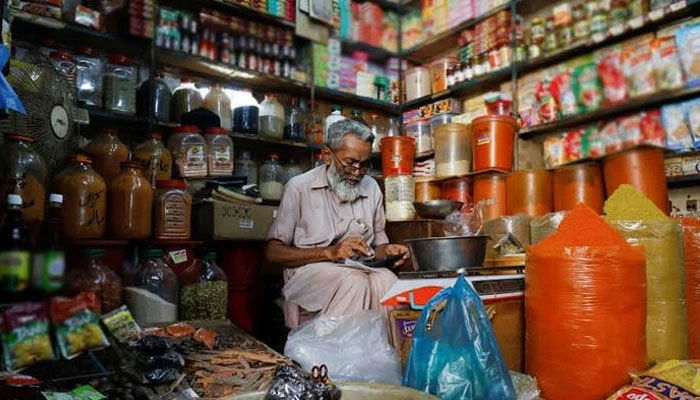FBR may tweak Tajir scheme, go after big retailers, spare small ones
FBR will now register big retailers and shopkeepers/traders on the basis of analysis of returns
ISLAMABAD: The Federal Board of Revenue (FBR) is giving indications of bringing major changes in the Tajir Dost Scheme (TDS) as it will kick-start actions against the biggest retailers based on credible information instead of collecting taxes from small retailers or traders.
The FBR will now register big retailers and shopkeepers/traders on the basis of analysis of returns, data security and commercial electricity consumption data by suspending the existing policy of fixed tax per shop/retail outlet.
This policy revision has been endorsed by the IMF or not will be the biggest question mark as the Tajir Dost Scheme failed to fetch the desired revenue collection. In the first quarter the target was envisaged at Rs10 billion and for the second quarter (Oct-Dec) period, the TDS collection was aimed to go up to Rs23.4 billion.
The FBR has agreed with the IMF for collection of Rs50 billion through TDS during the current fiscal year. Till last week, the FBR had so far fetched tax revenues of just Rs1.7 million from TDS throughout the country.
Under the revised policy, the FBR intends to register retailers based on credible information of concealment/evasion and not physical surveys of the shops. The door-to-door surveys of markets will not be carried out. The collection of fixed amounts of tax from each shop, irrespective of size, would not done under the revised policy.
The decision has been taken during a meeting held between the FBR team of members with Muhammad Naeem Mir, chief coordinator of Tajir Dost Scheme-2024, at the FBR on Tuesday.
-
 Prince William Should Focus On 'family Business' After Andrew Blunder
Prince William Should Focus On 'family Business' After Andrew Blunder -
 Katherine Schwarzenegger Pratt 'brought To Tears' By Sister-in-law's Gesture
Katherine Schwarzenegger Pratt 'brought To Tears' By Sister-in-law's Gesture -
 Prince William Makes Bold Claim About Britain's Creative Industry At BAFTA
Prince William Makes Bold Claim About Britain's Creative Industry At BAFTA -
 Andrew Mountbatten Windsor Insulting 'catchphrase' That Degarded Staff
Andrew Mountbatten Windsor Insulting 'catchphrase' That Degarded Staff -
 Kate Middleton, Princess Beatrice 'undercurrent Tension' Comes To Surface
Kate Middleton, Princess Beatrice 'undercurrent Tension' Comes To Surface -
 'Grey's Anatomy' Alum Katherine Heigl Reveals Why She Stayed Silent After Eric Dane Loss
'Grey's Anatomy' Alum Katherine Heigl Reveals Why She Stayed Silent After Eric Dane Loss -
 Host Alan Cumming Thanks BAFTAs Audience For Understanding After Tourette’s Interruption From Activist
Host Alan Cumming Thanks BAFTAs Audience For Understanding After Tourette’s Interruption From Activist -
 Jennifer Garner Reveals Why Reunion With Judy Greer Makes Fans 'lose Their Minds'
Jennifer Garner Reveals Why Reunion With Judy Greer Makes Fans 'lose Their Minds' -
 Chris Hemsworth Makes Shocking Confession About His Kids' Reaction To His Fame
Chris Hemsworth Makes Shocking Confession About His Kids' Reaction To His Fame -
 Wiz Khalifa Reveals Unconventional Birthday Punch Tradition With Teenage Son In New Video
Wiz Khalifa Reveals Unconventional Birthday Punch Tradition With Teenage Son In New Video -
 BAFTAs 2026: Kerry Washington Makes Debut In Custom Prada Gown
BAFTAs 2026: Kerry Washington Makes Debut In Custom Prada Gown -
 Jennifer Lopez Gets Emotional As Twins Max And Emme Turn 18
Jennifer Lopez Gets Emotional As Twins Max And Emme Turn 18 -
 Andrew Mountbatten Windsor Blunders Are Result Of 'conspiracy Of Silence'
Andrew Mountbatten Windsor Blunders Are Result Of 'conspiracy Of Silence' -
 Keith Urban Fires Entire Management Team After Divorcing Nicole Kidman
Keith Urban Fires Entire Management Team After Divorcing Nicole Kidman -
 Kylie Jenner Marks Death Anniversary Of Hairstylist Jesus Guerrero With '222' Tribute
Kylie Jenner Marks Death Anniversary Of Hairstylist Jesus Guerrero With '222' Tribute -
 Daniel Radcliffe On How It's Like Seeing New Harry Potter Cast Years Later
Daniel Radcliffe On How It's Like Seeing New Harry Potter Cast Years Later




